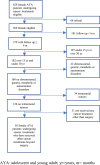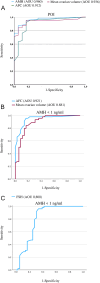Ovarian function in adolescents and young adults undergoing cancer treatment: biochemical and ultrasound marker analysis
- PMID: 39887687
- PMCID: PMC11896650
- DOI: 10.1530/EC-24-0511
Ovarian function in adolescents and young adults undergoing cancer treatment: biochemical and ultrasound marker analysis
Abstract
Objective: Gonadal dysfunction is a major late complication after cancer diagnosis and treatment. We aimed to study the prevalence of premature ovarian insufficiency (POI) and the potential reduction of ovarian reserve in a cohort of adolescent and young adult (AYA) patients undergoing cancer treatments, evaluating ovarian function and reserve markers. We also aimed to analyze how these markers are related to each other and to treatment-related risk factors.
Methods: We performed a retrospective study, including all female AYA patients undergoing cancer treatment during childhood or adolescence, who visited our pediatric gynecology outpatient clinic between January 1, 2018, and August 30, 2023. Serum levels of anti-Mullerian hormone (AMH) and follicle-stimulating hormone (FSH), antral follicle count (AFC) and mean ovarian volume were evaluated. The correlations between these markers and how their alterations are related to treatment-related risk factors were analyzed.
Results: The prevalence of POI in 95 patients was 18.9%. A significant positive correlation was observed between AMH levels and both AFC and ovarian volume. AMH was the most reliable serum marker for ovarian function in terms of POI. Independent risk factors for ovarian dysfunction in relation to all the markers analyzed were hematopoietic stem cell transplantation (HSCT) and high doses of alkylating agents (≥6000 mg/m2).
Conclusion: Gonadal dysfunction and infertility are quite common in AYA patients undergoing cancer treatment. High-dose alkylating agents and HSCT are the independent risk factors. AMH and FSH values, AFC and mean ovarian volume provide different but consistent information for closely monitoring patients after cancer treatment.
Keywords: adolescents and young adults; cancer treatment; infertility; premature ovarian insufficiency.
Conflict of interest statement
There is no conflict of interest that could be perceived as prejudicing the impartiality of the work reported.
Figures


Similar articles
-
Anti-müllerian hormone compared with other ovarian markers after childhood cancer treatment.Acta Oncol. 2019 Feb;58(2):218-224. doi: 10.1080/0284186X.2018.1529423. Epub 2018 Dec 18. Acta Oncol. 2019. PMID: 30558460
-
Female adolescents and young women previously treated for pediatric malignancies: assessment of ovarian reserve and gonadotoxicity risk stratification for early identification of patients at increased infertility risk.J Pediatr Endocrinol Metab. 2020 Oct 19;34(1):25-33. doi: 10.1515/jpem-2020-0272. Print 2021 Jan 27. J Pediatr Endocrinol Metab. 2020. PMID: 33068384
-
Correlation of Follicle-stimulating Hormone, Anti-Mullerian Hormone, and Antral Follicle Count with Age in Ovarian Reserve Testing.Int J Appl Basic Med Res. 2024 Jul-Sep;14(3):162-168. doi: 10.4103/ijabmr.ijabmr_81_24. Epub 2024 Aug 24. Int J Appl Basic Med Res. 2024. PMID: 39310079 Free PMC article.
-
The Evaluation of Ovarian Function Recovery Following Treatment of Primary Ovarian Insufficiency: A Systematic Review.Front Endocrinol (Lausanne). 2022 Apr 28;13:855992. doi: 10.3389/fendo.2022.855992. eCollection 2022. Front Endocrinol (Lausanne). 2022. PMID: 35573993 Free PMC article.
-
Reproductive ability in survivors of childhood, adolescent, and young adult Hodgkin lymphoma: a review.Hum Reprod Update. 2023 Jul 5;29(4):486-517. doi: 10.1093/humupd/dmad002. Hum Reprod Update. 2023. PMID: 36779325 Free PMC article. Review.
References
-
- Ferlay J, Ervik M, Lam F, et al. . Global cancer observatory. In Cancer Today. Lyon, France: International Agency for Research on Cancer. (https://gco.iarc.who.int/today)
-
- National Cancer Institute . Late effects of treatment for childhood cancer (PDQ)–health professional version. Bethesda, MD, USA: National Cancer Institute. (https://www.cancer.gov/types/childhood-cancers/late-effects-hp-pdq) - PubMed
-
- Targonskaya A, Wieczorek K & Maslowski K. Endogenous hormones and cognitive decline in women: unveiling the complex interplay. Women 2024. 4 116–129. (10.3390/women4020009) - DOI
LinkOut - more resources
Full Text Sources

